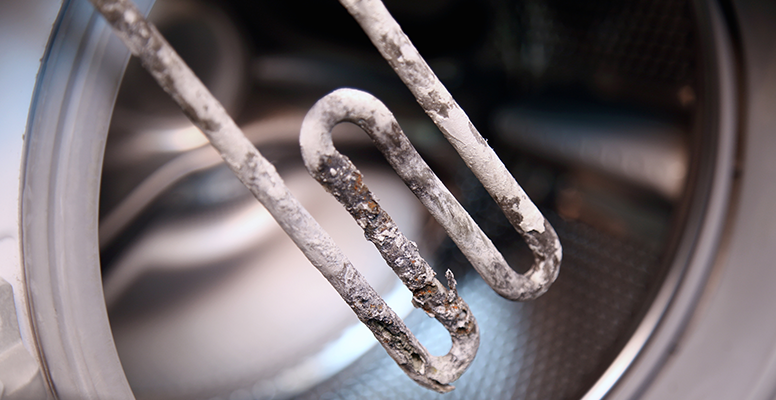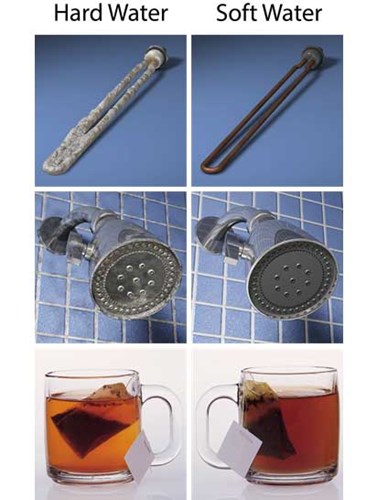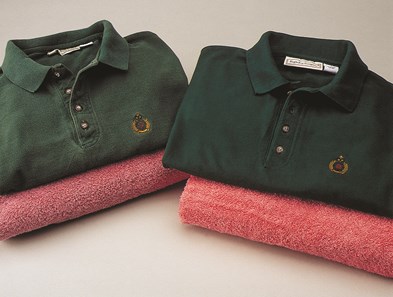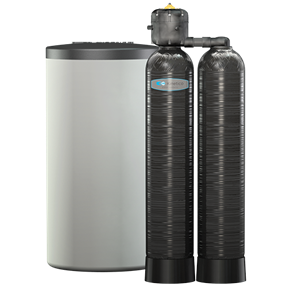What Is Hard Water?
Learn about hard water and how it affects you.

Hard water occurs naturally. As water travels through the ground, it comes in contact with and picks up minerals such as calcium and magnesium. These two minerals dissolved in water make it hard. Water hardness levels are measured in grains per gallon or parts per million (PPM). If your water measures as little as one grain per gallon of hardness, you have hard water. The more grains per gallon of hardness, the harder the water.
Curious To See If Your Home Has Hard Water? Schedule A Free Water Test Today!
According to the US Geological Survey, 85% of water in the United States is hard. Whether the water in your home is supplied by a well or the city, you likely have hard water. Though drinking hard water is not considered a health risk, hard water is the cause of many problems in your home. It may even be the reason for many skin and hair issues.
Symptoms of Hard Water
- Soap Scum
- Hard water can cause soap scum to form in sinks, tubs and showers. Hardness minerals in water mix with soap and create a soap curd that clings to surfaces. When water runs to drain, the soap scum stays behind, leaving a nasty-looking film that doesn’t rinse away easily. It’s unsightly and will continue to collect unless wiped clean regularly.
- Scaled Surfaces
- A white chalky buildup is often noticeable where water collects and then evaporates, like on shower doors and curtains and around drains. When water evaporates, the dissolved calcium and magnesium are left behind. It eventually builds up and is hard to remove. Constant cleaning and scrubbing are required to keep surfaces looking clean.
 Dingy Laundry
Dingy Laundry
- If you have hard water, you may have noticed your clothing looks dull after a few washes. It’s especially noticeable with whites. The same soap scum left in sinks and tubs also collects on clothing when washed. That’s why air-dried clothing is often stiff and why heat-drying causes clothing fibers to break down after time. Hard water often contains other minerals too, like iron, which can stain clothing. Changing detergents, adding bleach and using fabric softeners won’t solve the problem either.
- Scale on Water Fixtures
- Scale build-up on or around your water fixtures can be an eyesore as well as a problem. As the hard water passes through your faucet or showerhead, hardness minerals in the water are deposited. Over time, these deposits build up, are unsightly and eventually restrict the water flow. Stains and buildup also affect the appearance of fixtures.
- Scale in Water Pipes
- Just as scale build-up forms on fixtures, it also forms in water pipes. Although you can’t see it, mineral deposits build up inside water pipes and reduce water pressure. In extreme situations, this can lead to pipe replacements and other challenges in your home.
- Failed Water-Using Appliances
- Scale build-up often affects water-using appliances, especially ones that heat or use heated water, like water heaters, dishwashers, washing machines and coffee makers. Scale buildup ruins efficiency and over time can cause complete appliance failure which costs you money in repairs, replacement or increased energy use.
- Hair and Skin Problems
- Hard water requires more soap and shampoo to get a lather, but then it doesn’t rinse completely from skin or hair. The remaining residue can be irritating and the cause for dry, itchy skin or dull, unmanageable hair. Hard water is especially problematic for colored or treated hair. Special lotions, creams and conditioners are costly, yet they simply mask the problems without taking care of the cause.
How to Treat Hard Water
A water softening system is used to treat hard water. Water softeners use ion exchange to replace the hardness minerals in water (calcium and magnesium ions) with sodium ions to make the water soft. Once the water is soft, it will be better for your skin, hair and many things around your home, like your fixtures, appliances, plumbing, clothing and tableware. Learn more about how a water softener works here.
Kinetico offers several water softener options. Our state-of-the-art non-electric, multi-tank water softeners provide a continuous supply of soft water that’s better for you and your home.
To find out the condition of your water, including its hardness level, you should have your water tested.Contact your local Kinetico dealer today to schedule a free water test and to get a quote. Your local water expert can then discuss the best water treatment solutions to meet your needs.
Contact Your Authorized Kinetico Dealer Today To Schedule A Free Water Test!
